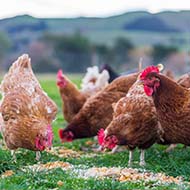UK declared free from avian influenza

International standards have been met to declare the country free from avian flu.
The UK has been declared free from avian influenza following a significant outbreak of the disease last winter.
Chief veterinary officer Christine Middlemiss said international standards have been met to declare the country free from avian flu but urged poultry keepers to remain vigilant for signs of the disease as the winter approaches.
“The last year has been very challenging for all those who keep poultry and captive birds, and I would like to thank everyone for their efforts in helping us contain the disease,” she said. “This is an important milestone that will help our efforts to re-open export markets.”
The highly pathogenic strain of avian flu continues to spread throughout Europe in both wild and captive birds. Experts fear that as winter sets in, the possibility of migratory birds flying to the UK will increase the risks for domestic poultry.
A total of 26 cases of avian influenza were confirmed in kept birds and wild poultry in the UK between November 2020 and March 2021. For all cases, the APHA introduced movement restrictions to mitigate the disease spread and carried out investigations into the source and potential spread of the infection.
Several measures were also introduced to protect poultry from wild birds, including a ban on bird gatherings and a requirement for bird keepers to keep their flocks indoors.
“While we are now free of bird flu in this country there is a constant risk of the disease returning through wild birds and this is likely to increase as winter approaches, temperatures fall, and more migratory birds start arriving in the UK,” Ms Middlemiss added.
“Poultry and captive bird keepers should maintain good biosecurity practises, such as cleaning footwear, feeding birds indoors, and minimising contact with wild birds. Building these simple actions into routines now will go a long way to limiting the risk of future outbreaks.”



 The latest
The latest